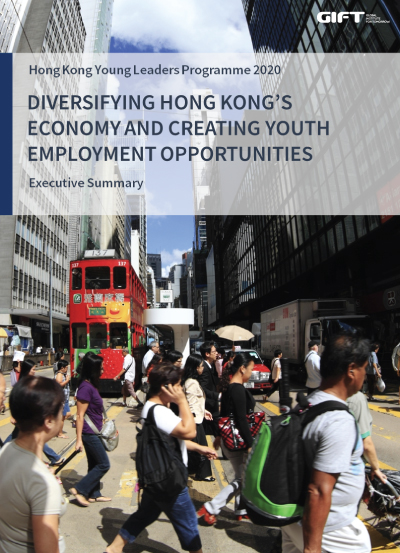Hong Kong faces unprecedented economic challenges, with its unemployment rate doubling from 2.9% to 6.1% as of August 2020, and youth unemployment reaching 11.4%. The combined effects of 2019’s social unrest and the COVID-19 pandemic have severely impacted labour-intensive service sectors such as retail, food and beverage, and hospitality—industries that traditionally employ a large proportion of young people.
This report lays out a comprehensive vision and strategic plan for revitalising Hong Kong’s economy by diversifying into four high-potential sectors: Healthcare, Urban & Green Technology, Aviation, and Biotechnology.
Central to this vision is a commitment to making Hong Kong a people-centric, economically vibrant, and socially cohesive city that provides the next generation with meaningful employment and opportunities to lead purposeful lives. The report outlines clear goals and policy recommendations across each focus area:
- Healthcare
Targeting a 30% increase in elderly caregivers by 2030, with innovative initiatives such as the Care Agent Scheme and Neighborhood Service Scheme to boost youth participation. The report also proposes establishing Community Wellness Clubhouses managed by youth, encouraging one million underprivileged residents to engage in wellness activities monthly, and positioning Hong Kong as Asia’s premier cold storage hub for pharmaceuticals by investing in cold chain infrastructure. - Urban & Green Technology
Envisions reducing energy consumption by 30% through expanded energy audits, levies on consumption, and a Building Retrofitting Financing Scheme. It calls for transforming the existing Green Tech Fund into an integrated platform combining public and private resources to promote a sustainable green economy. Additionally, it aims to develop local food production to satisfy 10% of Hong Kong’s consumption by 2030 through unlocking land, infrastructure investment, and supporting R&D. - Aviation
Seeks to establish Hong Kong as a world-class aviation education center by 2030 with the creation of an International Aviation Institute providing comprehensive training and industry collaboration. The report targets increasing Maintenance, Repair, and Overhaul (MRO) jobs to 30% of aviation employment through new hangars, subsidies for R&D, and tax incentives. It also aims to boost overnight visitors from 43% to 60% by introducing stopover travel packages, leveraging visa-free travel schemes, and launching youth tour guide programmes. - Biotechnology
Proposes building a Regional Biotech Centre to unify resources, coordinate applied research, and attract private investment in R&D. It emphasises branding Hong Kong as a trusted “Tested and Certified in Hong Kong” regional hub by developing new testing standards, incentives, and university degrees to professionalise the industry.
The vision is people-centric, aiming to build a socially cohesive and economically vibrant city that offers meaningful employment and fulfills the aspirations of future generations. This report is a call to action for policymakers, business leaders, entrepreneurs, investors, and civil society to align on long-term economic planning that fosters resilience, inclusivity, and quality of life for all Hong Kong residents.
This report was developed as part of GIFT’s Hong Kong Leaders Programme’s experiential project in 2020.


